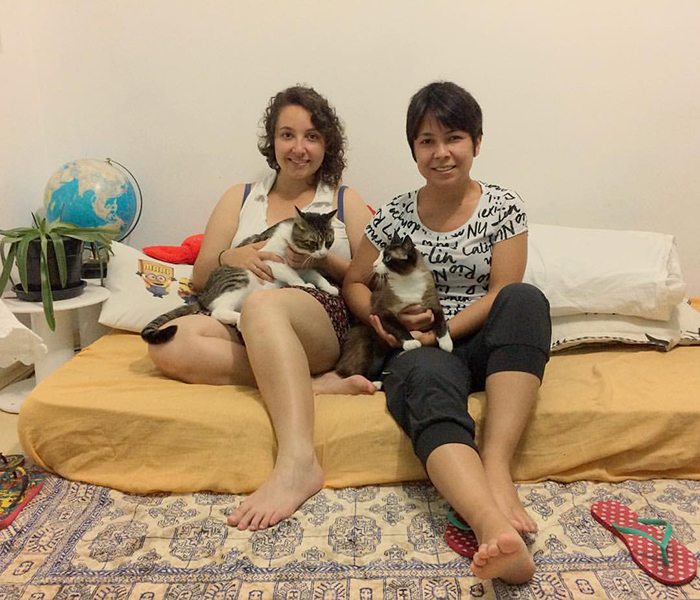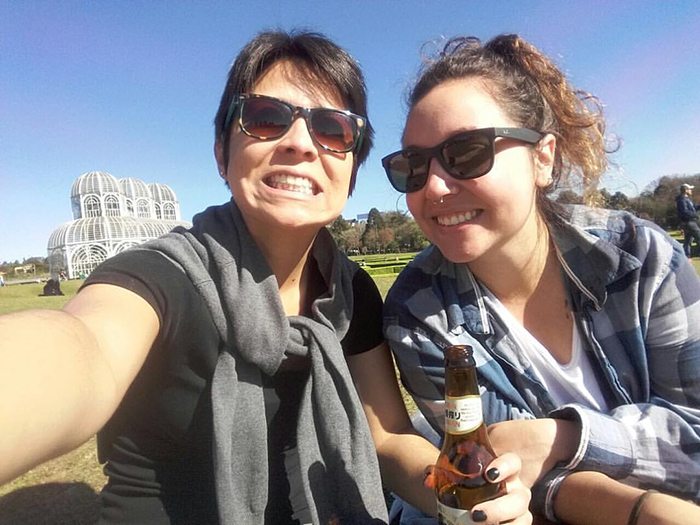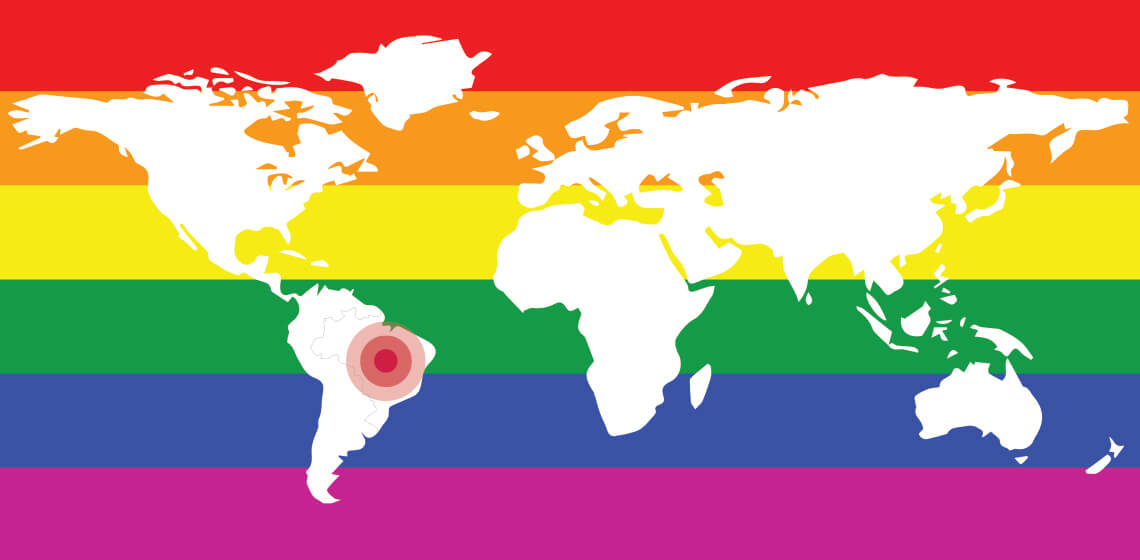“So, what’s it like living in Hungary?” “A pile of crap,” we say without hesitation when a friend from abroad asks. Because we Hungarians just love complaining. Actually, I often have the feeling that it is downright rude to be satisfied in this country. And of course even more so if you are part of a minority group.
But is it really that bad living (like a lesbian*) in Hungary? Is it so much better, easier, nicer (etc.) living somewhere else? Perhaps, not just anywhere, but definitely so in the West. Is that right?
We at qLit are usually suspicious about generalizations, so we wanted to find out. Inspired by this general attitude of negativity, we decided to run a monthly column to investigate what really is the case out there in the world. Every month we will interview a fellow lesbian* living in another country about her first-hand experiences. The goal is to find out how it feels to live in that country as a lesbian*, considering the political-legal situation, social life, and cultural background. While the interview is, by definition, personal -- the girls will provide their names and share their photos -- we strive to give you a more or less objective overview of the specific city and country.
In the very first interview, we invited Mari and Aryadne, a couple from Curitiba, Brazil. A couple of years ago Mari spent some time in Hungary as part of her studies and she was mesmerized by Budapest. In fact, so mesmerized that this fall she is bringing her girlfriend for a tour of Hungary.

But now it’s our turn to take a trip to Brazil. Let’s hear what they have to say about living there.
Thanks, girls, for accepting our invitation for the very first interview. Can you introduce yourself briefly?
Mariana: My name is Mariana Emiko Limas, I'm 26, a chemist and a sports fan, living in Brazil with my girlfriend and 3 lovely cats.
Aryadne: I’m Aryadne Ronqui, I am also 26 years old, working as a journalist and a writer. I am passionate about cinema and any kind of art. Like Mari said, we live together with our 3 cats (on the photo you only see 2 :-)).
 Where exactly do you live?
Where exactly do you live?
M&A: We both grew up and live in Curitiba, Brazil. It’s a big city in the South of Brazil. People have Rio in mind when they think of Brazil, but the truth is Brazil is huge and Curitiba for example is a lot more conservative than Rio.
How would you summarize the general situation of the LGBTQ community in Brazil? How is it to live there as an LGBTQ+ person in general?
M: Here in Brazil I see that the LGBTQ community has increasingly gained space. Of course, there is still a lot of prejudice, extreme cases of violence, and a great deal of ignorance. But in general you can notice a tendency that people respect love and different ways of living more and more.
A: Still, I would say Brazil is a dangerous place. Because of religion, the country is full of prejudice, practically against everything. It is true that LGBTQ+ people have some rights, like marriage, but the prejudice is so big that it can get someone fired, or even killed.
Then, if Brazil is so dangerous, does it mean that people are typically closeted? Are there any out public figures, politicians, athletes, actors/actresses?
M: Yes, there are! As examples I can list Fernanda Gentil (sports journalist), Luis Gustavo (comedian), Larissa França (volleyball player), or Marco Nanini (actor)...
That seems promising. Talking about rights, is same sex marriage legal?
A: Yes, it is. Although I think it can change for one state to another. In some places we can only get a certificate, in others we can have a real marriage.
Sounds progressive. Now tell me about rainbow families. Are there any ways to have a child officially together, in the sense that both parents are official parents?
M: Yes! The child also can have the name of both parents in the identity document.
For the adoption, the parents/persons just need to follow some rules:
-
Be at least 18 years old, regardless of marital status (yes, singles may also adopt);
-
Have a minimum difference of 16 years in relation to the child;
-
Not being a brother or an ascendant of the child to be adopted;
-
For two people to adopt together, they must be married or live in a stable union.
A: Well, even though it is legally possible, it must be underlined that adoption here is difficult for anyone, for a gay couple even more. We have to go through authorities, sometimes we need a lawyer. Because of all the prejudice, people think that the child won't grow up healthy or with good references.
M: Still, I know of a couple who recently adopted a little boy.
Now let’s see the professional domain. Is it usual to have openly LGBTQ+ people at the workplace?
A: Where we work, yes. It is common. But this is for gay, lesbian or bissexual people; I believe that for trans or non-binary people this is a lot more difficult.
 What about your private life? For example, when meeting a new group of people, how freely can you just come up with an LGBTQ+ related topic?
What about your private life? For example, when meeting a new group of people, how freely can you just come up with an LGBTQ+ related topic?
M: Usually, when I'm with my girlfriend, I introduce myself/herself as girlfriends and then people start asking about our lives (how did we meet, how does it feel to be living with a girl, etc). So it’s very smooth.
Great to hear. Where do you go out to socialize? Generally, how would you summarize lesbian* social life in your city?
A: It is nice. We have more places for gay AND lesbian people, not just one or another. We have a lot of events, parties, Pride.
M: Actually, as far as I remember, there's no specifically lesbian place here. There are of course many gay clubs, but I feel that they are focused on men.
 Then how do you meet new people? What kind of dating apps, dating sites are popular in your area among lesbians*?
Then how do you meet new people? What kind of dating apps, dating sites are popular in your area among lesbians*?
M&A: Tinder and Brenda.
That sounds nice. Practically, in Curitiba you have marriage rights, your immediate environment accepts you, there is some social life, and generally it is OK to be out. But you touched upon violence before. How usual are homophobia-related atrocities in your area?
A: A lot. As I already mentioned, in this country violence is very frequent. As for my city, Curitiba, it is in fact one of the most conservative and dangerous cities in Brazil. There is a strong fetishism about lesbians -- two girls together are somehow considered more acceptable than two men -- but there’s still the prejudice.
Altogether, do you like living in Curitiba? Would you recommend our community of Hungarian lesbians* to visit or live in Curitiba? If so, tell us some tips.
A: I loved living here when I was a kid, but I don’t anymore. I don’t like staying in a place which is so violent towards people like me. For a visit Curitiba is fine. Our city is beautiful; in the fall and in the winter it is even more lovely. There’s always a lot of fun stuff to do. But living here is dangerous, unhealthy, unhappy. I would leave once I have a chance.
Thanks a lot, girls. See you soon in Budapest.
Curitiba, a large city close to Rio -- a typical dream destination, also for the LGBTQ -- is not that welcoming for lesbians* in reality, as Aryadne and Mari explained to us.
Progressively, Brazil, or specifically this region, has legalized marriage and adoption for the LGBTQ community. But having rights is not enough. As the girls told us, it is still not safe to live as an LGBTQ person in Brazil; violence is shockinly pervasive.
Just because on the political level equality is forced on a society, if people are not ready, it just won’t happen.
But we’ll continue our quest in September. In the next interview, we will talk with Angela about North Carolina, Mallorca, and Amsterdam.

